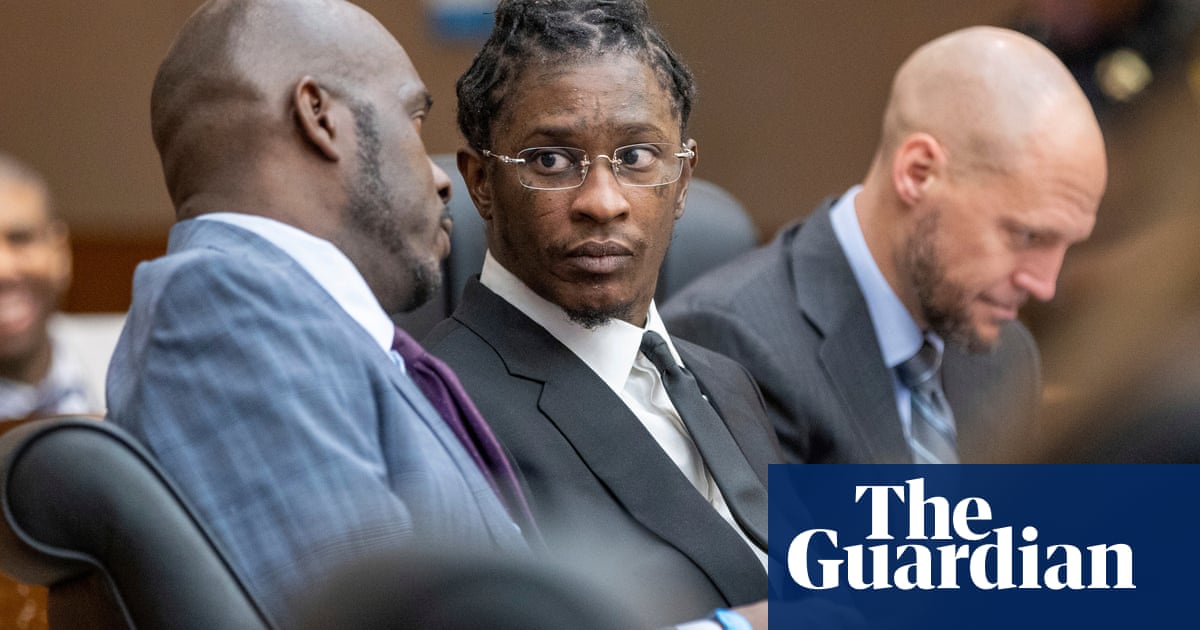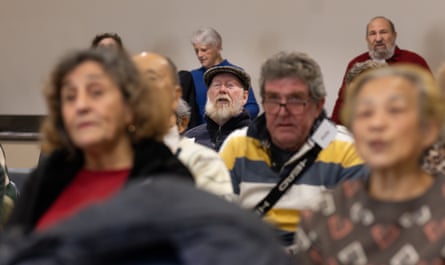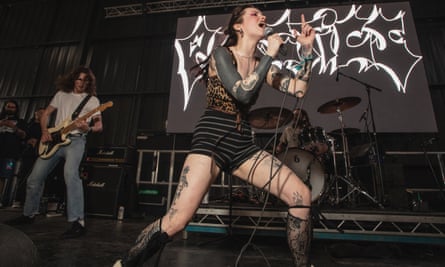
In the trial of popular American rapper Young Thug, a judge has ruled that lyrics can be used as evidence, a decision that has been criticized by organizations advocating for freedom of speech and other prominent artists like Jay-Z and Coldplay.
Jeffery Williams, also known by his stage name Young Thug, is a highly successful and critically acclaimed American rapper. His albums So Much Fun and Punk have both achieved top chart positions in the US. He is currently facing trial in his hometown of Atlanta on charges of racketeering for allegedly leading a criminal street gang known as YSL (Young Slime Life or Young Stoner Life). Members of this group have been accused of various crimes including murder and carjackings. Williams’ lawyers argue that YSL is simply a record label and music collective, with attorney Brian Steel stating that the rapper has not violated any laws.
Initially, a total of 28 individuals, including popular rapper Gunna (whose real name is Sergio Kitchens), were charged. Gunna accepted a plea deal that allowed him to maintain his innocence. Some of the other defendants also accepted plea deals, were not apprehended, or had their cases separated from the racketeering case. This resulted in Williams and five other individuals remaining to stand trial.
The presiding judge in the trial, Ural Glanville, has granted permission for prosecutors to use select lyrics from a song by Young Thug as evidence. He stated, “I will conditionally allow specific lyrics to be admitted.”
During the hearing, Glanville addressed Williams’s lawyers and contended that the prosecutors were not pursuing charges against their clients solely based on the content of their songs. Rather, they were using the songs as evidence to potentially implicate their clients in other matters. Glanville stated that he did not view this as a violation of free speech.
According to Fox 5 Atlanta, Mike Carlson, the prosecutor, stated that the lyrics are being utilized as evidence to demonstrate YSL’s involvement in racketeering and their status as a criminal street gang. He further explained that they have obtained confessions related to murder, making these lyrics valuable evidence.
Simone Hylton, the prosecutor, referenced song lyrics during the court proceedings. She stated: “I just beat a murder rap, I paid my lawyer 30 for that.” There were additional lyrics mentioned before concluding with: “Me and my associates are not bound by the law.”
The defense lawyers argued that the lyrics were a form of creative expression and could not be used as evidence or proof of wrongdoing. Doug Weinstein, the attorney for Deamonte Kendrick, also known as Yak Gotti, who is on trial with Williams, stated that there is a significant issue being overlooked, which is the artistic aspect of the situation. According to Weinstein, the art should be separated from reality. He also pointed out that Kendrick’s lyrics reflect his experiences and surroundings, so it is unrealistic to expect him to sing about topics such as Daydream Believer or puppies and rainbows.
More and more people are expressing their disapproval of using song lyrics as proof of criminal activity. This tactic has been employed in the legal proceedings against American rap artists like Tekashi 6ix9ine and Tay-K in recent times. It is becoming more prevalent in the United Kingdom, as evidenced by a study conducted by the Guardian which uncovered 240 instances of this practice in the past three years.
In January 2022, Jay-Z and Meek Mill were among the supporters of a proposed amendment to New York state law. This amendment aims to prohibit the use of lyrics as evidence in criminal cases. State senator Jamaal Bailey argued that the admission of art as evidence goes against our constitutional right to free speech. He also stated that the use of rap and hip-hop lyrics specifically reflects the racial bias present in our criminal justice system.
A similar law has been suggested in the state of Georgia by US representative Hank Johnson, who believes that using lyrics as evidence for a person’s state of mind should not be allowed.
In September 2022, California made it illegal to use lyrics as proof in trials within the state. Harvey Mason Jr, leader of the Recording Academy responsible for the Grammy awards, hailed it as a significant win. He stated, “Muting any style or type of creative expression is a transgression against all those involved in music.”
Unable to obtain bail multiple times, Williams spoke to his supporters from prison, urging them to sign the Protect Black Art petition. He emphasized the importance of using music as a means of artistic expression and expressed his belief that Black artists and rappers are not given the same creative freedom as others. Kitchens echoed this sentiment upon his release, stating that his art is not permitted to exist solely as entertainment due to his identity as a Black man in America.
In November 2022, the Protect Black Art movement received support from the three major labels, streaming and social media companies, and numerous artists such as Megan Thee Stallion, Coldplay, Future, and Post Malone. This was shown through an open letter that voiced their stance against the use of rap lyrics in trials, deeming it “un-American and morally incorrect”. The letter also emphasized that rappers are storytellers who create intricate worlds with multifaceted characters who can portray both good and evil. It further stated that rap lyrics are being unfairly used as confessions in an effort to criminalize Black creativity and artistry, more so than any other art form.
Glanville stated that after a 10-month jury selection process, Williams’s trial will commence on November 27th and is anticipated to span six to nine months.
The artist dropped an album titled “Business Is Business” while incarcerated, which peaked at the second spot on the US charts following its June release.
Source: theguardian.com



















